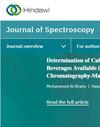利用毛细管电泳亲和模式快速筛选Fe3+与转铁蛋白和转铁蛋白相互作用的结合常数
IF 2.1
4区 化学
Q4 BIOCHEMICAL RESEARCH METHODS
引用次数: 3
摘要
采用亲和毛细管电泳技术研究了铁离子与转铁蛋白和转铁蛋白(无铁形式)的相互作用行为。蛋白质在毛细管中与金属离子结合时质量和电荷的变化导致其迁移时间的变化,并通过快速筛选方法用于测量非共价结合相互作用。采用乙酰苯胺作为电渗流量(EOF)标记物,避免实验过程中EOF的变化可能造成的误差。结合结果由蛋白质(Ri)和EOF标记物(Rf)的迁移率比计算,公式为(Ri−Rf)/Rf或∆R/Rf。为了更全面的理解,研究了相互作用的动力学并计算了结合常数。结果表明,在较低的金属离子浓度(5 ~ 25 μmol/mL)下,Fe3+与两种蛋白的相互作用不显著。转铁蛋白在50和100 μmol/mL浓度下(ΔR/Rf = 0.0114和0.0201)与金属离子表现出显著的相互作用,转铁蛋白在较高的Fe3+浓度(100和250 μmol/mL)下表现出较强的结合相互作用(ΔR/Rf = - 0.0254和0.0205)。Fe3+与转铁蛋白和转铁蛋白相互作用的结合常数分别为18.968 mmol−1和- 13.603 mmol−1,显示出显著的相互作用。Fe3+与两种蛋白的不同结合模式可能是由于转铁蛋白中的铁结合位点已经被占据,而转铁蛋白中则没有。本研究可为蛋白质-金属离子、药物-蛋白质、药物-金属离子、酶-金属离子相互作用的研究提供参考,并为新型金属基药物的开发提供初步思路。本文章由计算机程序翻译,如有差异,请以英文原文为准。
Rapid Screening and Estimation of Binding Constants for Interactions of Fe3+ with Two Metalloproteins, Apotransferrin and Transferrin, Using Affinity Mode of Capillary Electrophoresis
The interaction behavior of Fe3+ with transferrin and apotransferrin (iron-free form) was investigated in this study using affinity capillary electrophoresis. Change in the mass and charge of protein upon binding to the metal ion in the capillary tube led to variation in its migration time and was used to measure the noncovalent binding interactions by fast screening method. Acetanilide was used as the electroosmotic flow (EOF) marker to avoid possible errors due to the change in EOF during the experiment. The binding results were calculated from the mobility ratios of protein (Ri) and EOF marker (Rf) using the formula (Ri − Rf)/Rf or ∆R/Rf. For more comprehensive understanding, the kinetics of the interaction was studied and binding constants were calculated. Results showed that the Fe3+ displayed insignificant interaction with both proteins at lower metal ion concentrations (5–25 μmol/mL). However, transferrin exhibited significant interactions with the metal ion at 50 and 100 μmol/mL (ΔR/Rf = 0.0114 and 0.0201, resp.) concentrations and apotransferrin showed strong binding interactions (ΔR/Rf = −0.0254 and 0.0205, resp.) at relatively higher Fe3+ concentrations of 100 and 250 μmol/mL. The binding constants of 18.968 mmol−1 and −13.603 mmol−1 were recorded for Fe3+ interaction with transferrin and apotransferrin, respectively, showing significant interactions. Different binding patterns of Fe3+ with both proteins might be attributed to the fact that the iron-binding sites in transferrin have already been occupied, which was not the case in apotransferrin. The present study may be used as a reference for the investigation of protein-metal ion, drug-protein, drug-metal ion, and enzyme-metal ion interactions and may be helpful to provide preliminary insight into the new metal-based drug development.
求助全文
通过发布文献求助,成功后即可免费获取论文全文。
去求助
来源期刊

Journal of Spectroscopy
BIOCHEMICAL RESEARCH METHODS-SPECTROSCOPY
CiteScore
3.00
自引率
0.00%
发文量
37
审稿时长
15 weeks
期刊介绍:
Journal of Spectroscopy (formerly titled Spectroscopy: An International Journal) is a peer-reviewed, open access journal that publishes original research articles as well as review articles in all areas of spectroscopy.
 求助内容:
求助内容: 应助结果提醒方式:
应助结果提醒方式:


